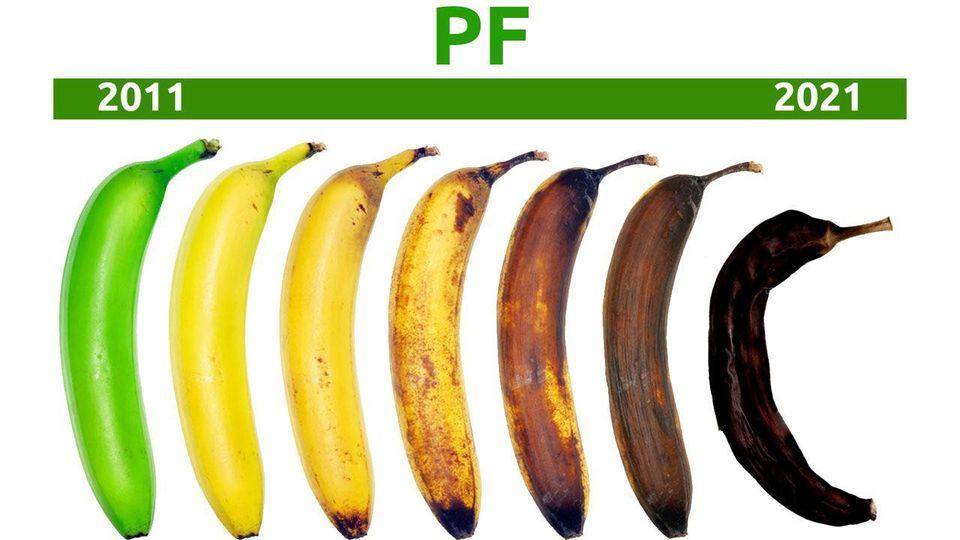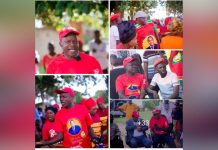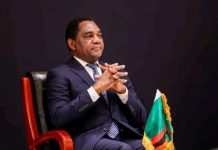Africa-Press – Zambia. THE Patriotic Front (PF) was kicked out of power by the opposition during the 2021 general election, much the say as two other former ruling parties. First it was the United National Independence Party (UNIP), which lost to the then newly formed Movement for Multiparty Democracy (MMD) in 1991. After twenty years in power, the MMD also ceded power to the PF, which had been in existence for 10 years at the time.
The PF has made its own history thus far for the shortest period in power, 10 years. This contrasts with UNIP which ruled for 27 years, notwithstanding that it had only the frog on the ticket against Kenneth Kaunda for about 18 years since the abolishment of multiparty politics and introduction of the so-called one party-participatory democracy in 1973. The MMD ruled for two decades (twenty years) amid political competition from the newly-crowned king of the jungle, the United Party for National Development (UPND), and the PF itself. Both UNIP and MMD are now mere boardroom, if not nashala neka (I am left alone) parties, with no real impact and diminishing popularity. If one wants to be sarcastic, one would call them mere NGOs (Nothing Goes Ons).
The question is, will PF make history again, positive this time, as the first former ruling party to bounce back to power? Or will it submit to the historical reality and follow the footsteps of UNIP and MMD? Time will tell, no doubt. I present arguments for both scenarios.
The leaders of UNIP and MMD have been too stubborn to accept the reality that their parties are finished for good. Just as with the previous elections, the results of the just-ended elections vividly prove the point that it is finished for these two parties. But guess what, their leaders will attempt another election just to remain relevant to the political scene. It is alleged that they keep putting their names on the ballot just to benefit from donor funding, but I have no hard facts to prove this point. Maybe you do?
UNIP is Zambia’s oldest surviving political party. I say surviving because the oldest political party in the history of this country was the Africa National Congress (ANC), which closed shop after the signing of the unity accord in 1972. The accord heralded the one-party participatory ‘democracy’. UNIP is also the oldest existing opposition party and, until he was kicked out before the last election, Tilyengi was the longest serving opposition leader, having been at the helm since 2001.
UNIP governed the country from 1964 to 1991 and Kaunda had been at its helm since its founding in 1960. It ceded power in 1991 to the MMD, whose candidate Frederick Chiluba polled a whooping 76 per cent to Kaunda’s 24 per cent. The MMD won 125 of the 150 elected seats in the National Assembly. Eighteen of UNIP’s 25 were in the Eastern Province where the party retained all the seats. The result effectively consigned UNIP as a regional party and reconfirmed the Eastern Province as the most conservative region, having done the same in 1963.
Kaunda stepped down as president of UNIP in 1992, following the party’s famous Namayani congress during which Kebby Sililo Kambu Musokotwane was elected president of the party, with Kaunda’s support. In 1993 Musokotwane and Kaunda differed after the former admitted that a radical faction of the party was conspiring to topple the new government of Chiluba. Kaunda and UNIP viewed this as a betrayal of the party and its ‘comrades’. For the next two years Musokotwane led a shaky and divided UNIP such that when Kaunda announced plans for a political comeback, Musokotwane was shunned by Kaunda’s loyalists and party elders. He was forced to step down in 1993 as Kaunda retook the leadership with Senior Chief Inyambo Yeta as his vice, when the logical thing would have been for him to support another young leader.
Kaunda was hoping to bounce back to power during the 1996 election. However, ‘political engineer’ Chiluba used MMD’s overwhelming majority in parliament, in May 1996, to push through controversial constitutional amendments, specifically the parentage clause. This technically knocked Kaunda, whose parents hailed from Nyasaland (Malawi), out of the race. Yeta was equally barred by the traditional leaders’ clause. As a result, UNIP boycotted the elections, allowing Chiluba to be easily re-elected with 73 per cent of the vote. This was a tactical miscalculation on UNIP’s part as it allowed MMD, which did not win a single seat in the Eastern Province in 1991, to enter its ‘bedroom’ unchallenged.
As Elias Munshya writes, “With the loss of that Eastern region came the rapid fall of a party that once led Zambia into independence. Ironically, the same man who built UNIP to its climax in the 1960s also presided over its downfall in the 1990s. With that 1996 boycott, Kenneth Kaunda hammered the last nail in UNIP’s coffin.”
The party returned to contest the 2001 elections with Tilyenji as its presidential candidate; he received only 10 per cent of the vote, finishing fourth out of the eleven candidates. In the National Assembly the party won 13 seats, majority in the Eastern Province, and 10.6 per cent of the popular vote. That was the last time it ever had seats in parliament as a single entity. Prior to the 2006 elections the party joined the United Democratic Alliance alongside the other two largest opposition parties, FDD and UPND. Hakainde Hichilema of the UPND was the alliance’s presidential candidate, finishing third with 25 per cent of the vote. The alliance won just 26 seats in the National Assembly. The vast majority were contributed by UPND, with UNIP contributing only Mkhondo Lungu of Lundazi.
Tilyenji and UNIP did not contest the 2008 presidential by-election, but he was nominated as UNIP’s presidential candidate for the 2011 elections. Since then, Tilyenji has contested the republican presidency three times (2011, 2015 and 2016) but each time losing miserably with less than one per cent of the total vote (0.36 per cent in 2011; 0.58 per cent in 2015; and 0.24 per cent (8,928 votes) in 2016). In both 2011 and 2016 UNIP failed to win a single seat in the National Assembly nor council seat anywhere across the country. Come 2021 its candidate, Reverend Trevor Musonda Mwamba, managed only 3,036 out of the available 4,959,332 votes. What a shame!
With these dwindling fortunes, UNIP is technically dead. What is worse, the party does not seem to be in politics for the business of politics. Analysts have argued that UNIP exists simply for the sake of its business interests that its leaders hold under Zambia National Holdings Limited. That explains the current court wrangles between 11 members and four of Tilyenji’s cohorts over lack of intraparty elections since 2005 and alleged sale of named party assets without membership approvals.
The story is the same with MMD. Its candidate for the election Nevers Mumba, a former Republican Veep, could only harvest 4,968 votes. Yes, you heard me right, less than 5,000 from the whole Republic during the last election. The MMD failed to field a presidential candidate in 2016 due to internal squabbles. However, the first time they did since losing power to PF in 2011, Mumba only managed 14,609 of the available 1,671,662 votes.
MMD’s representation in parliament and councils has also been dwindling since 2006 when it last won a general election. Whereas it had 75 seats in 2006, the figure went down to 55 in 2011, three in 2016 and zero (0) in 2021. Although the full results at council level are yet to be publicised, it is plausible to guess that MMD has zero nationwide. In short, MMD is as technically dead as UNIP.
The question of the day is, will PF wither the same way? The answer, in my view, is neither here nor there. Our guesses can be based on two scenarios: 1. the mentality of Zambian voters generally based on history; and, on the positive side for PF; 2. how the party handles its leadership transition. We can use the experience of UNIP and MMD on the later point to weave and this may give hope to the PF.
On the negative side, history is not on PF’s side. The experience of the other two former parties, as articulated already, spells bad news for the PF. The reality is before us. What is not with us is reasons why former parties go into oblivion. One theory, in my view, lies with voter behaviour. Could it be that Zambians by nature always want something new? Zambian revelers, for instance, migrate from one new pub to the next. In short, they are migratory. Could that factor in itself have an influence on their voting patterns? If that is the case then that’s it for PF. It will join the queue of UNIP and MMD.
On the other hand, and potential positive point for PF, there are some controllable factors that UNIP and MMD didn’t manage well which the PF can control and avoid disintegration. One of them is transition from and leadership change. Both UNIP and MMD were bedeviled by post-election leadership squabbles that resulted in the party being torn apart. I have alluded to how the Kaunda-Musokotwane fights divided and tore down UNIP. Similarly, the Rupiah Banda vs Nevers Mumba and Felix Mutati vs Mumba squabbles led to the split of MMD into two halves: one heading to UPND and the other to PF.
The other two external factors that might have a bearing on the resurgence or otherwise of PF is the performance of the UPND in government and evolution and growth of the other opposition parties. If UNPD underperforms and an alternative and viable third force among the opposition parties emerges, it would spell doom for PF. During the reigns of MMD and PF there was always an emerging alternative party. With 63 MPs and a none-existent third force, PF will for now remain the only alternative.
The other question is whether the PF’s legacy of infrastructure development might save them. MMD opened the economy and were the first to bring about decency in the transport sector and retail markets (modern malls and supermarkets). They could boast of having brought back multiparty democracy and brought down the mighty waikatako wapya UNIP. However, all these achievements didn’t save them.
To conclude, the key fundamentals do not favour a PF comeback nor mere survival. Only time will tell if it will turn the tide and re-script the political history of the country. Good luck!







